Parrots, with their vibrant plumage, charismatic personalities, and remarkable mimicry skills, have long captivated the imagination of humans. These intelligent and sociable birds are known for their vocalizations, acrobatic displays, and playful antics.
However, one peculiar behavior commonly observed in parrots, as well as in many other animals, is yawning. While yawning in humans is often associated with tiredness or boredom, the reasons behind parrots yawning are more complex and multifaceted.
In this intriguing exploration, we delve into the fascinating world of parrots to uncover the underlying motives and possible explanations for their yawning behavior.
We will explore various theories put forth by researchers and experts in avian behavior, shedding light on the potential functions and significance of this seemingly simple yet enigmatic act.
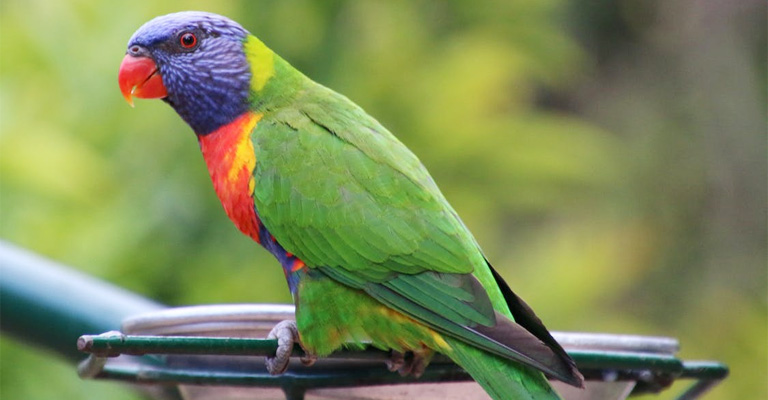
The Science of Yawning in Parrots
If you are a bird enthusiast, you must love to learn about the science behind their behavior. Here are some points that help you understand the science behind parrots’ yawning.
Yawning Reflex in Birds
Yawning is a reflex that is triggered by the brain and is not limited to humans. In birds, the reflex is similar to that of humans, with the bird opening its beak wide and inhaling deeply.
Yawning is thought to be a way for birds to increase the oxygen supply to their brain and cool down their brain.
Factors That Trigger Yawning in Parrots
Yawning in parrots can be triggered by several factors, including tiredness and overheating. When a parrot is tired, yawning can help to increase alertness and keep them awake. Similarly, when a parrot is overheated, yawning can help to cool down the body.
The Role of Yawning in Keeping Parrots Alert
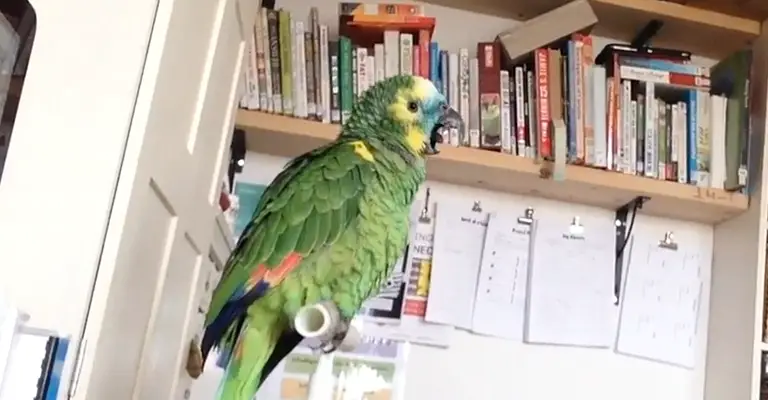
Yawning in parrots is thought to play a role in keeping them alert. The deep inhalation that occurs during a yawn increases the oxygen supply to the brain, which can help to keep the bird awake and alert. This is especially important for parrots that are active during the day and need to stay alert to avoid predators.
Theories on Why Parrots Yawn After Preening
One theory on why parrots yawn after preening is that it helps to stretch the muscles in the crop and readjust the facial bones.
Additionally, preening is a very intimate activity and yawning may be a way for parrots to show appreciation and happiness for the attention they received during preening.
Another theory is that the process of preening can cause feathers to move in the ear canal making the bird uncomfortable and yawning can help to realign the feathers.
It’s important to note that the exact reason why parrots yawn is not fully known, and these theories are just educated guesses based on observations.
Common Reasons for Excessive Yawning in Parrots
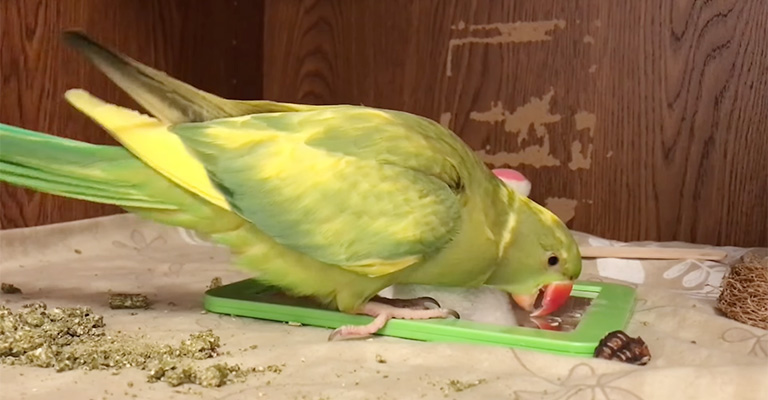
There are some usual reasons parrots yawn excessively. Sometimes, these are not the regular thing and you should have learned them in advance. Here are the reasons.
Respiratory Diseases
Excessive yawning in parrots can be a symptom of respiratory diseases, such as chronic respiratory infection (CRI) or aspergillosis.
These diseases can cause inflammation and blockages in the bird’s respiratory system, leading to difficulty breathing and excessive yawning.
Bacterial or Yeast Infections
Bacterial or yeast infections can also lead to excessive yawning in parrots. These infections can cause inflammation in the bird’s mouth and throat, making it difficult for them to swallow and causing them to yawn in an effort to clear their throat.
Something Stuck in the Bird’s Throat
Excessive yawning in parrots can also be caused by something stuck in the bird’s throat, such as food or a feather. This can cause discomfort and difficulty swallowing, leading to excessive yawning as the bird tries to dislodge the object.
If a parrot is experiencing excessive yawning, it is important to take them to a veterinarian for a check-up. Excessive yawning can be a sign of an underlying health issue and prompt veterinary care can help to diagnose and treat the problem. Additionally, a vet can rule out any physical issues that may be causing excessive yawning.
Other Reasons for Yawning in Parrots
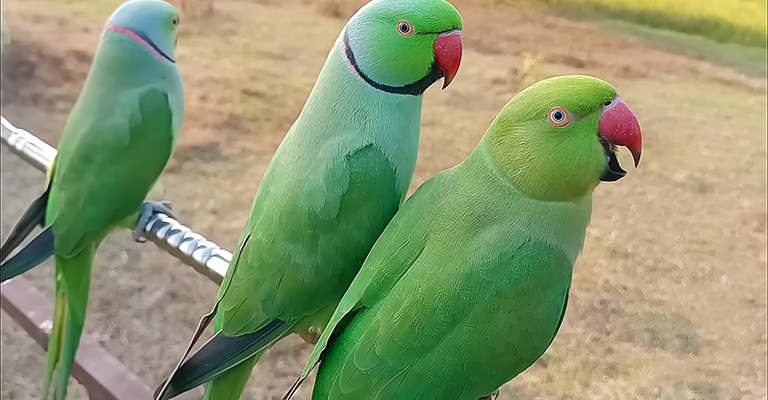
Also, there are some other reasons that can bother your parrots. Don’t forget to check them out.
Stretching Muscles and Readjusting Facial Bones
Yawning in parrots can also be a way for them to stretch their muscles and readjust their facial bones.
This is especially true for parrots that have been sitting in one position for a long period of time. Yawning can help to relax the muscles and readjust the bones, making the bird more comfortable.
Showing Appreciation and Happiness
Parrots have a wide range of expressions and behaviors to communicate their emotions. In some cases, parrots may yawn as a way to show appreciation and happiness for the attention and care they are receiving from their owners. They may yawn after receiving a scritch or when they feel happy and content.
Exhaustion and Needing Sleep
Exhaustion and needing sleep can also be a reason for yawning in parrots. Birds are active creatures and need adequate rest to maintain their health. Parrots that are not getting enough sleep may yawn as a sign of fatigue and indicate they need to rest.
It’s important to note that yawning in parrots can have multiple reasons and it can be a combination of the above-mentioned reasons.
Observing the behavior of the parrot and looking out for other signs of distress can help to identify the exact cause of the yawning.
When examining yawning in parrots, we can explore the differences between frequent and regular yawning, shedding light on their potential causes and implications.
Yawning in Parrots: Differences between Frequent and Regular Yawing
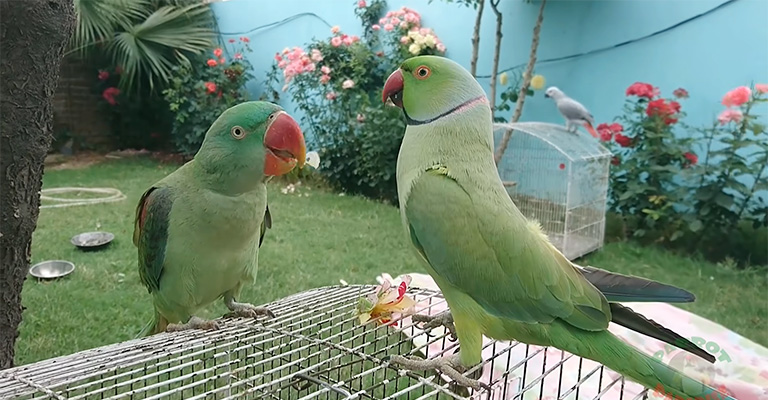
Frequent yawning refers to an increased frequency of yawning episodes exhibited by parrots. It occurs more often than what would be considered normal for a specific individual or species.
Frequent yawning can be influenced by various factors, including external stimuli, environmental conditions, and the bird’s overall health and well-being.
For instance, parrots in stressful or unfamiliar situations may experience an elevated frequency of yawning as a response to anxiety or tension.
Regular yawning, on the other hand, represents yawning occurring within the typical range for a particular parrot or species.
Regular yawning can have several functions, which may vary depending on the context. Here are some potential reasons for regular yawning in parrots:
Physiological Regulation
Yawning plays a role in regulating the parrot’s physiological state. It helps with oxygen intake and carbon dioxide expulsion, assisting in maintaining an optimal balance.
Regular yawning may occur to ensure sufficient oxygen levels, especially after periods of inactivity or during transitions between rest and activity.
Communication
Parrots are highly social creatures and employ various forms of communication to interact with conspecifics and humans. Yawning can serve as a communicative signal, conveying messages to other birds or individuals in their environment.
It can indicate relaxation, contentment, or readiness for certain activities. Parrots may yawn in the presence of familiar individuals to establish a sense of security or as a sign of affiliation.
Emotional Expression
Parrots possess complex emotional lives and can display their feelings through behaviors such as yawning. Regular yawning can be associated with emotions like boredom, fatigue, or relaxation.
Parrots may yawn when they feel calm and at ease in their environment, or when they are winding down after engaging in mentally or physically stimulating activities.
Social Contagion
Parrots, like many other animals, can exhibit contagious yawning. When one parrot yawns, it may trigger a yawning response in nearby individuals. This contagious behavior is thought to be a result of social bonding and mimicry.
Regular yawning within a group of parrots can create a synchronized and cohesive atmosphere, fostering a sense of unity and connectivity.
It’s important to note that excessive or abnormal yawning in parrots should be assessed by a qualified avian veterinarian.
Frequent or excessive yawning, especially when accompanied by other symptoms like lethargy, loss of appetite, or changes in behavior, could indicate an underlying health issue that requires attention.
FAQs
It is possible that parrots may yawn as a sign of boredom, as they may not be getting enough stimulation or activity. However, it is important to note that yawning can also be triggered by other factors such as tiredness or overheating, so it is important to observe the bird’s overall behavior to determine the cause of the yawning.
Stress can lead to changes in a parrot’s behavior, including yawning. Stress can cause changes in a parrot’s hormone levels and affect its breathing, which can lead to yawning. However, it is important to note that yawning can also be caused by other factors such as fatigue or respiratory issues, so it is important to observe the bird’s overall behavior to determine the cause of the yawning.
Pain can lead to changes in a parrot’s behavior, including yawning. Pain can cause changes in a parrot’s hormone levels and affect its breathing, which can lead to yawning. However, it is important to note that yawning can also be caused by other factors such as fatigue or respiratory issues, so it is important to observe the bird’s overall behavior to determine the cause of the yawning.
It is normal for parrots to yawn at any time of the day, as they may be triggered by factors such as tiredness or overheating. However, if a parrot is excessively yawning during the day, it may be a sign of an underlying health issue and it is recommended to take them to a vet for a check-up.
Wrapping Up
We have discussed the topic of why parrots yawn and the different factors that can trigger this behavior. We have learned that yawning in parrots is a reflex that can be triggered by tiredness, overheating, and other factors.
You’ve also learned about the common reasons for excessive yawning in parrots such as respiratory diseases, bacterial or yeast infections, and something stuck in the bird’s throat.
Now, you must have a proper idea of why your parrots yawn so often. Make sure to find the reason so that you can find out the solution. Best of luck and thanks for your support.